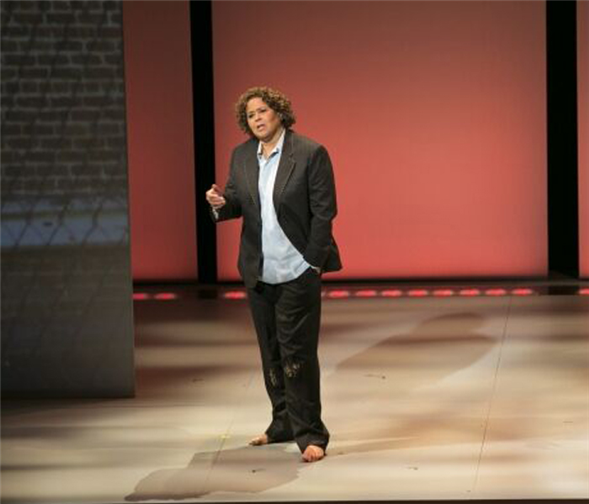Translate Page

Inside Anna Deavere Smith's latest solo show
---
Leonard Foglia has directed theatrical events of all scales, including an epic production of the opera Moby Dick that included a sprawling ensemble and eye-popping sets and projections. Yet the versatile director/librettist/novelist contends that the antithesis of such a production – the solo show – can be equally challenging.
"You don't have a scene where, all of a sudden, 'Oh! The young people run on stage now to change the rhythm,'" he laughs. "One person has to change it."
Foglia proved his acumen for shaping solo pieces with Thurgood, which featured Laurence Fishburne as Supreme Court justice Thurgood Marshall and bowed on Broadway in 2008. Now he's returning to the form as the director of Notes From the Field, the latest solo showcase for writer-performer Anna Deavere Smith. (The play is currently in previews at Second Stage.)
Smith initially reached out to Foglia after she saw Thurgood, and they quickly collaborated on her 2009 solo piece Let Me Down Easy, which explores issues of health and wellness.
Among other things, Smith responded to Folgia's sensitivity for sweeping cultural issues. "He certainly had a chance by directing Thurgood to learn about the very beginnings of the American journey towards equity in education," she says. "He brings that understanding to this project, which seeks to fan the flames of a potential and much needed modern civil rights movement."
While developing Notes, Smith conducted videotaped interviews with students, teachers, parents, and other citizens concerning the inequities of poverty, the escalating conflicts between the police and minority communities, and the plights within public schools that foster the so-called "school-to-prison pipeline." In a montage of verbatim excerpts, the chameleon actress plays nineteen characters, delivering the interviewees' personal accounts with an uncanny recreation of their verbal and physical mannerisms.
This bravura skill that has made her one of the defining artists of the "verbatim theatre" genre. In landmark shows like Fires in the Mirror, about the Crown Heights riot of 1991, and Twilight: Los Angeles 1992, about the L.A. riots, she conjured entire communities with nothing but her body, her voice, and the words of everyday people. Artists and companies like Nilaja Sun (No Child), The Civilians (This Beautiful City), and Tectonic Theater Project (The Laramie Project) are her clear descendants, and as Foglia notes, she herself is still demonstrating what this type of theatre can do.
{Image1}
"Anna invented that genre that's been so often copied by others," he says. "She endlessly studies the videotapes. Even though she does recreate very specific minutiae – a hand raise here or a voice inflection there – the point is not what they sound like; the point is who they are. Ultimately, she's trying to get to the core of who they are, but most important, what they have to communicate."
A key word Foglia stresses repeatedly is "rhythm."
"That was the particular challenge of Thurgood, because Laurence had to embody everything," he says. "He and I talked a lot about internalizing the rhythm changes – which was something he did brilliantly. At times I may gently prod and remind an actor that, 'We're going to a new place here – here's the place that it's going; what is our rhythm and how do we change it?' Laurence could turn on a dime and try anything. He doesn't want to talk about it; he just wants to do it. He'd say, 'What do you want? Okay, let's try it! We'll know soon enough, won't we?'
"With Anna's piece, it's a bit different because she plays different characters. So we spent a lot of time changing the order of the characters and just seeing how the rhythm of the show changed with that.
"Working on a play like Thurgood or any other new piece, I may say, 'Let's talk about this moment: how does the character feel about this?' But those questions don't apply with Anna's piece. She can't ask those questions because the people she's interviewed have already provided that. If the [interviewed] person laughed or yelled at a particular moment, Anna is going to laugh or yell. She's not going to reinterpret their words. So the kind of discussions we did have related to the several interviews she's done. There's a wealth of material there, so Anna can take the character in a different direction simply by going to a different place in the interview."
Foglia contends that performers and authors will ultimately process his directorial guidance in their own unique fashion. "All you can do is suggest, make your case," he says. However, he does have a firm belief in what is most needed from him in any production, large or small: "The best thing you can do for any performer or author is to tell them the truth."
---
Jeff Potter is an arts journalist and musician living in Washington Heights.
Photos taken from an earlier production of Notes from the Field at Boston's American Repertory Theater. Photos by Evgenia Eliseeva.
TDF Members: Go here to see our latest discounts for theatre, dance, and concerts.